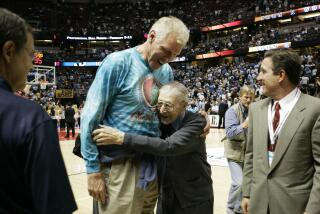A Prodigal Son
Whenever John Wilson finds himself on a trip with the University of Kentucky baseball team, he asks for hotel stationery to write his father.
A few weeks later, Wilson usually receives a reply from the California Men’s Colony in San Luis Obispo, where his father, Jack, is serving 10 years for the attempted murder of his only son.
Why would Wilson continue to communicate with a man who twice fired shotgun blasts through the locked door of Wilson’s Reseda home three years ago, leaving him with 22 pellets in his chest, a punctured lung and a nightmare no teenager should ever have to experience?
“I think it helps me more than it helps him,” Wilson said. “There’s no point in dodging it. I’m not running from my past.”
Amid the bluegrass of Lexington, Ky., a story of forgiveness and perseverance is unfolding.
Wilson entered last week leading Kentucky with a .355 batting average, 16 home runs and 32 runs batted in. His seven homers in Southeastern Conference play topped all players.
“I think he’s one of the best cleanup hitters in the SEC,” said Keith Madison, Kentucky’s coach.
How Wilson ended up more than 2,000 miles from his San Fernando Valley roots is part of a 10-month odyssey that he describes as “insane.”
It began on Sept. 30, 1996, the morning after Wilson’s 18th birthday. Jack Wilson came to the family home looking for his estranged wife, Cynthia. She had moved out several weeks earlier with Wilson’s 17-year-old sister, and John was in the process of moving to an apartment for his freshman year at Cal State Northridge.
According to police, Jack Wilson fired a shotgun blast through the front door, wounding John in the right arm, then fired again, hitting John in the chest.
John spent two weeks in the hospital recovering. Early visitors saw his bloody wounds and wondered if he’d survive, let alone play baseball again.
A month later, he was back on the baseball field. He was a redshirt at Northridge and expected to be one of the team’s top returning players when the school announced in June of 1997 it was dropping baseball. Another crisis, another dilemma.
Wilson had lived all his life in the Valley, playing at Northridge Little League and L.A. Baptist High. Northridge coaches were frantically calling across the nation trying to place players, and Kentucky expressed interest in Wilson.
He didn’t want to leave family and friends, but it was an opportunity to start over.
“It got to the point I couldn’t go to the Northridge Mall without turning people’s heads,” he said. “Not because I was a good ballplayer, but because they knew what I had gone through with my family.”
He made the decision to leave even after Northridge reinstated baseball three months later.
“The one thing I told myself was once I decided to come to Kentucky, I wasn’t going to come back to L.A. with my tail between my legs,” he said. “I was going to succeed.”
Wilson hit .330 last season as a freshman third baseman. This season, he was switched to catcher, a position he hadn’t played since Little League.
“Every day, there’s something new to learn,” he said.
Every day, there’s something new to deal with.
His mother is planning to remarry and he recently learned his grandfather has cancer.
“It seems like every corner there’s another hurdle in the way,” Wilson said. “I’m the oldest 20-year-old I know.”
He has no regrets about attending Kentucky. He’s enjoying his college experience in a rural town far from home.
“I was a little homesick today,” he said by phone. “I go through spells. But it’s a great college town.”
A day doesn’t go by that his Kentucky teammates fail to remind him he’s from Southern California.
“The first sign of sunshine, I wear shorts and sandals,” he said.
Now that the local radio station has begun carrying Jim Rome’s sports-talk program, Wilson feels even more at home.
“That’s my edge, born and raised in [Southern California],” he said.
Last week, Kentucky played at Arkansas. Meeting around home plate were Wilson and Tim Montez, a former Northridge assistant and the pitching coach at Arkansas.
“We started laughing, ‘Yeah, this is far away from Northridge,’ ” Montez said.
Montez witnessed Wilson’s progress, athletically and personally, over the last three years and considers him an inspiration.
“He has a good perspective on things,” Montez said. “He knows there’s been a lot of tragedy in his life, but at the same time, he knows the man upstairs has a plan for him. Through adversity, he’s built up a lot of character.”
Wilson continues to write his father, telling him about baseball and school. His father responds by writing about his experiences as a born-again Christian. Jack Wilson’s earliest release date from prison is 2005.
Wilson thinks of his father when he sees teammates talking with their parents after games. He misses not having someone to share the thrill of hitting three home runs against Georgia or getting four hits against Minnesota.
“It kills me not having my dad experience this,” he said. “I know when I have my son, this would be the greatest experience. Every summer, Father’s Day is the hardest day to play on.”
Madison coaches Wilson, but he has learned from him, too.
“I’ve learned a lot about forgiveness,” Madison said. “He’s a guy who never feels sorry about himself. He said, ‘You know, I’ve forgiven my dad. I love my dad.’ That taught me if you ever want to move on, you have to forgive.”
Wilson presses on, unyielding in his commitment to succeed and unwilling to let the past tarnish his future.
“I just realized what I have out here is special,” he said. “If that accident hadn’t happened, if the [Northridge] program hadn’t been dropped, I wouldn’t be doing this.”
Eric Sondheimer’s local column appears Wednesday and Sunday. He can be reached at (818) 772-3422.
More to Read
Go beyond the scoreboard
Get the latest on L.A.'s teams in the daily Sports Report newsletter.
You may occasionally receive promotional content from the Los Angeles Times.











